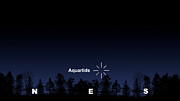Night Sky: May 2025
2 May 2025
While NOIRLab works to unravel the secrets of the Universe, you can start your own journey to explore the night sky right from your backyard. There are plenty of celestial events for skywatchers to observe every month. Below are some highlights. If you’d like to explore more on your own, we recommend Stellarium, which has a web interface and app.
Note: Never look directly at the Sun through binoculars or a telescope, or with your unaided eyes. Serious eye damage can occur.
3 May: Moon and Mars conjunction
The Moon and Mars will appear very close together in the sky, as the Moon approaches first quarter.
5–6 May, eta Aquariids meteor shower
The eta Aquariids are one of the best meteor showers of the year for southern hemisphere observers, producing about 50 meteors per hour from a dark site. Northern hemisphere observers can see 10–30 meteors per hour. Produced by the leftovers of Halley’s Comet, they do not have a sharp peak, meaning you should be able to see some meteors a few days before and after the night of the 5th–6th.
The shower’s radiant point — the spot from which it appears to emanate — rises above the eastern horizon at 11:30 p.m. from La Serena, 2:30 a.m. from Tucson, and 5:30 a.m. from Hilo. You’ll still be able to see meteors before the radiant rises.
22 and 23 May: The Moon hangs out with Saturn and Venus
You’ll have to get up early for this one. About an hour before sunrise on the 22nd, the Moon will be near Saturn. On the morning of the 23rd, the Moon will slide over to Venus.
Contacts
Jason Davis
Email: jason.davis@noirlab.edu





